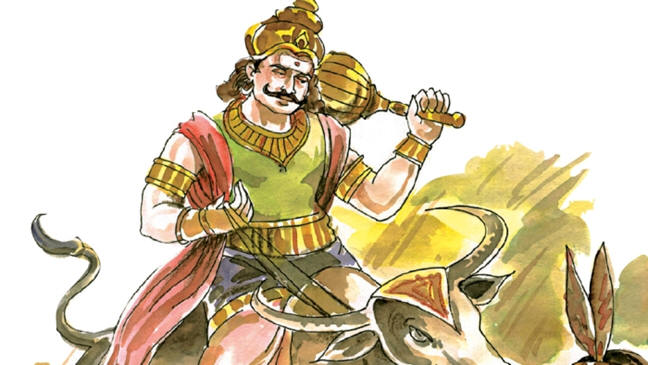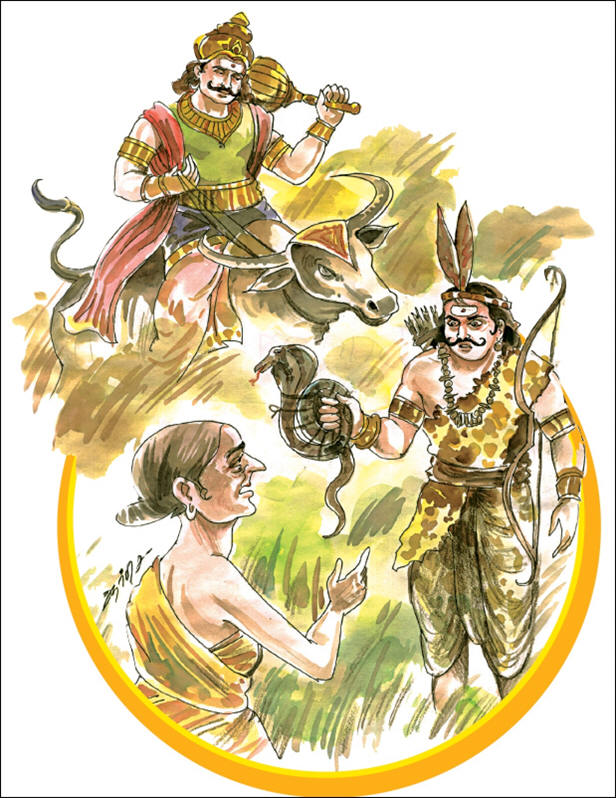Bhishma
Published:06 Apr 2020 8 PMUpdated:06 Apr 2020 8 PM Sakthi Vikatan
கர்மமே காரணம்! Karma alone is the cause.
சக்தி விகடன் டீம் Sakthi Vikatan Team

1. In the Kurushetra war, struck down by arrows, Bhishma was lying on a
bed of arrows on the battlefront. Dharma came to take a Darshan of him.
2. Dharma: “You are the best
among us. Duryodhana (the mortal enemy) did not see you in this
condition. I must be the
sinner to see you suffer. I could have sustained death in the war
instead of you. Instruct us on the path to erase our sins in the next
world.” Dharma thus expressed to Bhishmar his mental anguish.
3. Bhishma narrated his story. “Dharmaputra! Caught in the clutch of
Karma, you blame yourself as the cause of these events. Karma’s play is
very subtle beyond the perception of the senses. Listen to this old
story in connection with this.”
4. The son of Goudhami died of snakebite. Arjunakan (the hunter) tied up
the snake with the string of his bow, brought it to Gaudhami, and sought
her permission to cut the snake into pieces or to burn it in the fire.
5. Gaudhami answered him, “You
are an ignoramus! Don’t kill the snake. Let it go free. Will my son come
back to life if you kill the snake? Will you be at a loss if the snake
lives?”
6. The hunter did not change his stance and said, “I know you will talk
in this manner. Peace seekers lose this kind of opportunity. Seekers of
good results use the presenting opportunity and find freedom from
misery. In that vein, I will kill the snake.”
7. Gautami did not accept the hunter’s explanation, and said, “Dharmam
is the life of the good. The ignoramus suffers daily.
I do not entertain any anger toward the snake. It is compassion
and happiness to let the enemy go alive and free
than to kill him.” She remained calm and composed.
8. The hunter did not appear to yield and remained firm in his belief.
He said, “Killing the snake earns me good merits. Merits received
from good deeds over a long period is not as immediate as the merits
obtained by killing the evil life. Killing the snake prevents the loss
of many other lives. Letting the snake go free means the loss of life of
many lives.” That was the gist of his argument.
9. Gautami and the hunter were
firm in their opposing opinions. The snake half-dead by this time,
suddenly spoke.
10. The snake spoke, “O Hunter! What do I gain because I
bit the youngster? I did not bite for food or because of
hostility. What prompted me was Yaman (god of death). This sin will
gravitate to Yaman.” The snake tried to absolve itself from its
responsibility.
11. The hunter tightened his grip on the snake and shouted at it saying,
“You caused the death. You
put the blame on Yaman. Though Yaman prompted you, you are the doer of
the deed. The doer is the sinner and the culprit. We should not let you
go.”
12. That moment Yaman made his appearance.
13. Yaman addressed the snake, saying, “O Sarpa! You talked like an
all-knowing jurist and blamed me. Time goaded me. I prompted you. Time
is the root cause of the death of the youngster. All the Mobiles and
Immobiles (சலம்-அசலம்)
come under the control of Time. Time is the cause of creation and
dissolution. If I were a culprit, you are also one.”
14. The agitated snake said, “You blamed on Time. What authority do we
have blame Time?
Let us try to absolve ourselves of the blame put on us.”
15. The hunter interrupted the
snake and said, “You (Yaman) are responsible for the youngster’s death.
We must kill the snake and ridicule Yaman.”
16. Yaman addressed the hunter saying, “Time is the ordainer of events.
We act under the aegis of Time.”
17. Confusion prevailed. The
Kala Purusha came to them.
18. Kala Purusha said, “I am Time,
responsible for the death of the youngster. Yama and the snake
are not the killers. The son of this woman died as the consequence of
his own Karma, meaning his acts. We are under the purview and power of
Karma. The karma drives each individual . We cooperate and collide with
each other in the carriage of karmic justice.” That was the clear and
established modus operandi of Karma, as said by Kala Purusha.
19. Gautami, with a sigh of relief, said, “Dear hunter, do you
understand it? Let the snake go.” The hunter let go of the snake. Both
were free of their grief.
20. Bhishma finished telling his
story.
21. Bhishma said, “Dharmaputra! Understand that this world exists
because of Karma. Duryodhana or you are not responsible for the
death of so many in this battle. Time (Kala) dispensed the appropriate
fruits of their actions of the Karma of each individual.”
